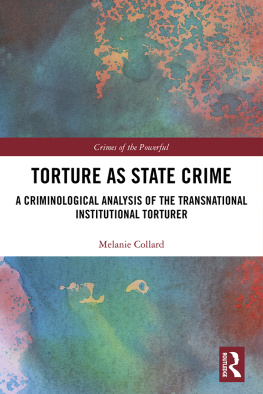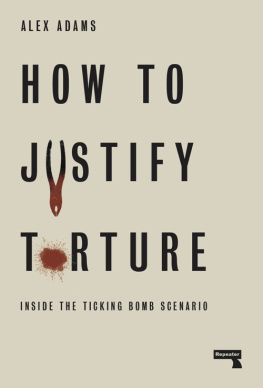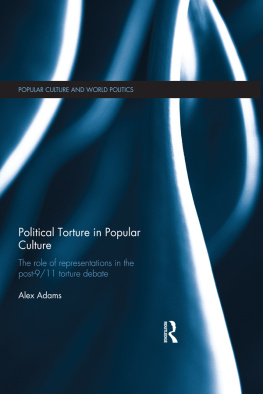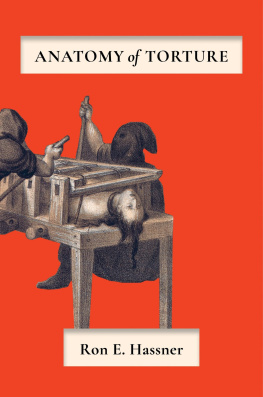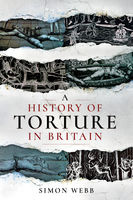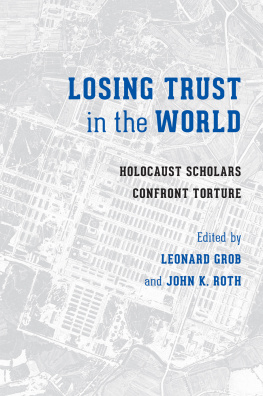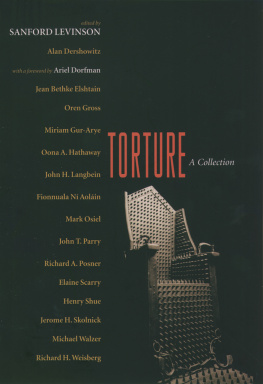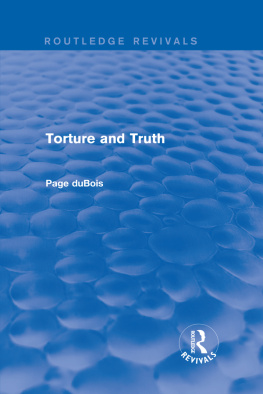TORTURING TERRORISTS
This book considers the theoretical, policy and empirical arguments relevant to the debate concerning the legalisation of interrogational torture. Torturing Terrorists examines, as part of a consequentialist analysis, the nature and impact of torture and the implications of its legal regulation on individuals, institutions and wider society. In making an argument against the use of torture, the book engages in a wide-ranging interdisciplinary analysis of the arguments and claims that are put forward by the proponents and opponents of legalised torture.
This book examines the ticking bomb hypothetical and explains how the component parts of the hypothetical are expansively interpreted in theory and practice. It also considers the effectiveness of torture in producing ticking bomb and infrastructure intelligence and examines the use of interrogational torture and coercion by state officials in Northern Ireland, Algeria, Israel and as part of the CIAs High Value Detainee interrogation programme. As part of an empirical slippery slope argument, this book examines the difficulties in drafting the text of a torture statute; the difficulties of controlling the use of interrogational torture; and problems such a law could create for state officials and wider society. Finally, it critically evaluates suggestions that debating the legalisation of torture is dangerous and should be avoided.
The book will be of interest to students and academics of criminology, law, sociology and philosophy, as well as the general reader.
Philip N.S. Rumney is Professor of Criminal Justice at Bristol Law School, UWE. He has written a number of articles on the debate over the legalisation of interrogational torture, including a detailed analysis of the effectiveness (or otherwise) of torture as a means of producing accurate and timely intelligence disclosures. He has also authored work that examines the way in which interrogational torture can serve to undermine counter-terrorism strategies by provoking retaliation or hardening the resolve of terrorist groups and their supporters. Amongst his various research interests Philip engages in research concerning rape and freedom of expression. This work has been cited in various government reports, reviews and parliamentary debates. He is actively engaged in several empirical and developmental projects concerning sexual violence, including a school-based sexual violence myth-busting project; a domestic and sexual violence bystander intervention project; an evaluation of a specialist police rape investigation unit; and a study of attitudes towards people charged with serious criminal offences.
It is an unfortunate truth that the issue of torture continues to be a matter of debate, particularly in regard to wars on terror and, therefore, terrorists. The strength of Professor Rumneys valuable book lies not only in the insight of a sharp critical intelligence, but also in his skill at presenting and assessing such empirical information that is relevant to considering the claims about the actual consequences of resorting to torture as a matter of public policy. It would make a wonderful assignment in any course on the subject, though it should also be read and discussed by policymakers as well who may be tempted to believe that torture works.
Sanford Levinson, W. St. John Garwood and W. St. John Garwood, Jr. Centennial Chair and Professor of Government, The University of Texas at Austin, USA
There is a general consensus in the public debate that the state should never use torture as a means of interrogating terrorists and that the use of torture as a tool of interrogation is so clearly contrary to democratic values that even the discussion of his topic has become virtually taboo. Phil Rumney, in this courageous and path-breaking study, challenges the view that the issues surrounding the use of torture have been finally settled and cannot be discussed. Instead, he makes a compelling case that without confronting the moral dilemmas presented by the use of torture in the face of the threats posed by international terrorism the absolute prohibition of the use of torture may not be sustainable. This book makes an invaluable and original contribution to a controversial, but important, public debate.
Christoph Bluth, Professor of International Relations and Security,
University of Bradford, UK
TORTURING TERRORISTS
Exploring the limits of law, human rights and academic freedom
Philip N.S. Rumney
First published 2015
by Routledge
2 Park Square, Milton Park, Abingdon, Oxon OX14 4RN
and by Routledge
711 Third Avenue, New York, NY 10017
Routledge is an imprint of the Taylor & Francis Group, an informa business
2015 Philip N.S. Rumney
The right of Philip N.S. Rumney to be identified as author of this work has been asserted by him in accordance with sections 77 and 78 of the Copyright, Designs and Patents Act 1988.
All rights reserved. No part of this book may be reprinted or reproduced or utilised in any form or by any electronic, mechanical, or other means, now known or hereafter invented, including photocopying and recording, or in any information storage or retrieval system, without permission in writing from the publishers.
Trademark notice: Product or corporate names may be trademarks or registered trademarks, and are used only for identification and explanation without intent to infringe.
British Library Cataloguing in Publication Data
A catalogue record for this book is available from the British Library
Library of Congress Cataloging in Publication Data
Rumney, Philip N. S., author.
Torturing terrorists : exploring the limits of law, human rights, and academic freedom / Philip NS Rumney.
1. Torture (International law) 2. Torture victims--Legal status, laws, etc. 3. Detention of persons. 4. Terrorism--Prevention--Law and legislation. 5. Military interrogation. 6. Human rights. I. Title.
KZ7170.R86 2014
344.05254--dc23
2014012536
ISBN: 978-0-415-67162-0 (hbk)
ISBN: 978-0-415-67163-7 (pbk)
ISBN: 978-0-203-08334-5 (ebk)
For Mum,
Sam Burton and Martin OBoyle
CONTENTS
It is customary for book authors to claim that their work would not have been possible without the support of friends, family and colleagues. This book is no different. I want to thank Heidi Lee of Routledge, who has shown enormous patience when deadlines have slipped. Special thanks go to my mum for her love and support. Without her I may have given up on education altogether. My colleagues and friends have also been an invaluable source of distraction and advice, including Steve Riley, Rachel Fenton, Dean Rhodes, Mark OBrien, Lauren Rees and Ed Cape. Thanks go to Tove Oliver, who provided much support and encouragement when I received rejection letters from several publishers. I also want to say a huge thank you to my two closest friends, Sam Burton and Martin OBoyle. Their friendship has provided a welcome distraction from the writing of this book while we have discussed and debated anything and everything related to work, politics and combat sports. Mandy Ingram has shown great patience, love, humour and support, plus coffee, cake and a keen eye for detail. Archie Ingram has provided the welcome distraction of cowboy gunfights. Huge thanks to my personal trainers and boxing coach, Gavin Brown, Trevor Scott and Dan Sarkozi. Over the last few years they have helped me work off the chocolate and made the pain of training worthwhile with their friendship.


